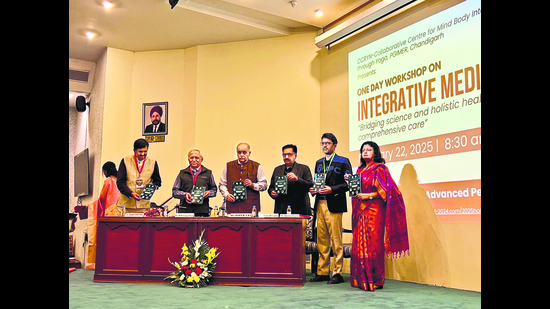Chandigarh: Experts push for yoga, Ayurveda integration at PGIMER workshop
The workshop, organised by CCRYN-Collaborative Centre for Mind-Body Intervention through Yoga, focused on integrating Ayurveda, yoga and other complementary therapies with modern medicine to enhance patient care
The Post Graduate Institute of Medical Education and Research (PGIMER) hosted a workshop titled “Integrative Medicine: Bridging Science and Holistic Healing for Comprehensive Care” at APC auditorium, located on the premises of the facility, on Saturday.

The workshop, organised by CCRYN-Collaborative Centre for Mind-Body Intervention through Yoga, focused on integrating Ayurveda, yoga and other complementary therapies with modern medicine to enhance patient care.
Experts at the event discussed the need for standardised herbal medicine practices, evidence-based yoga therapy and policy-level changes to make integrative healthcare more accessible.
Dr Sadasivan Pillai, toxicologist and director of PNB Vesper Lifesciences, highlighted the need for stricter compliance with Good Manufacturing Practices (GMP) as per Schedule T of the Drugs and Cosmetics Rules, 1945.
“Currently, 40 herbal manufacturing companies are registered with the Drug Controller General of India (DCGI), However, nearly 7,000 companies are producing herbal products. Strict implementation of pharmacopoeial standards is crucial to ensure the quality of herbal medicines,” Pillai said.
Dr Pillai shared his personal experience of using yoga to recover from severe respiratory issues during COVID-19. “Practising six different types of breathing exercises twice a day significantly improved my health,” he said.
Dr BN Gangadhar, chairman of the National Medical Commission (NMC) and emeritus professor at National Institute of Mental Health and Neurosciences (NIMHANS) Bengaluru, was the chief guest at the event.
“We want to make yoga available with mainstream medical care and the government is working in the same direction,” he said, adding that yoga was originally intended not as a cure for illness but as a preventive tool to maintain overall health.
Gangadhar acknowledged that while no formal policy exists to integrate yoga comprehensively into medical healthcare, several initiatives were being undertaken.
The NMC has made integrated medicine services and research mandatory in all medical colleges, while the Ayush ministry is establishing Advanced Centre for Integrative Health Research in various institutions.
All AIIMS, including PGIMER, now offer yoga facilities for patients, reinforcing the growing recognition of its role in holistic healing.






